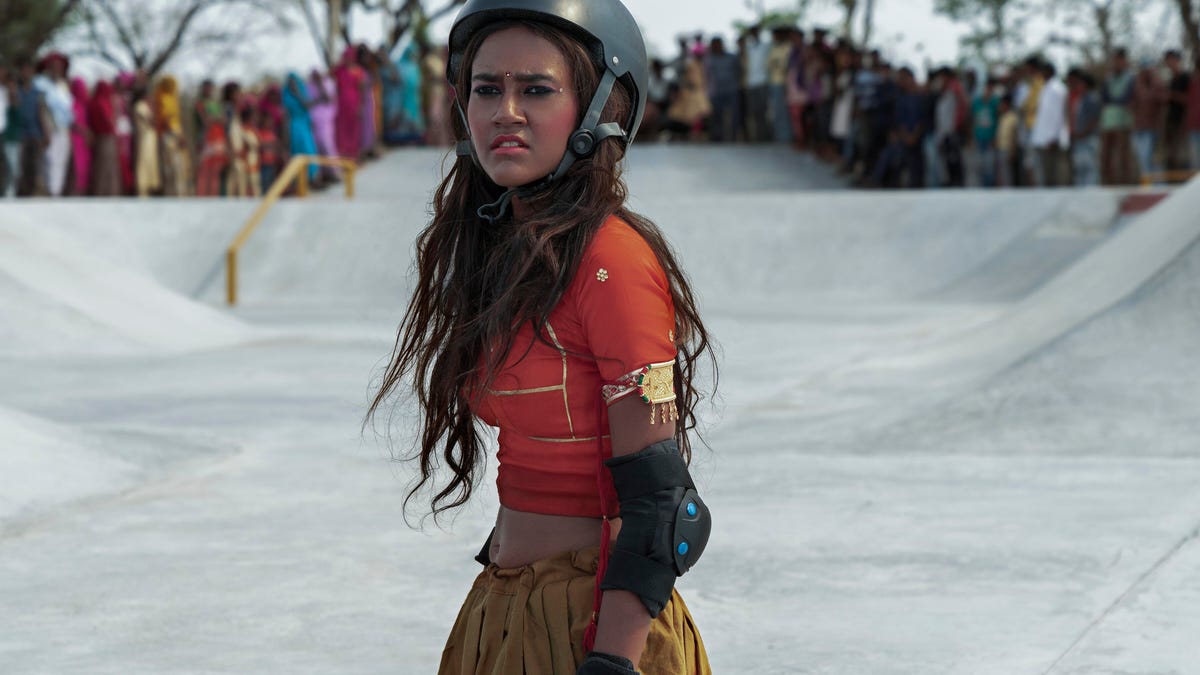Skater Girl on Netflix a powerful, joyful story of challenging the status quo
The movie's director and lead actors discuss the film about skateboarding in rural India, and the importance of authentic representation.

When Prerna discovers a love for skateboarding, she struggles to balance her passion and local traditions.
In the opening scene of Skater Girl on Netflix , a teenage girl tugs on a purple rope attached to a rudimentary skateboard made from a slab of wood and scrap metal wheels. She runs along a dusty road, laughing and looking back as her little brother sits on the makeshift board, gleefully shouting "faster, faster!"
The film tells the story of Prerna, a girl from a poor family in rural India who's always expected to obey her parents. When Jessica, an advertising executive from London, arrives at the village to learn more about her late father's family, she finds Prerna and other local kids playing with their makeshift boards, unaware of skateboarding's popularity around the world. Soon, Jessica gets real boards for the kids, and decides to build a skate park for them to foster their new passion.
The joy that Prerna and her brother Ankush feel while skating down dusty village roads is palpable. They've found respite from a life of poverty and restrictive social norms, especially for girls, in their remote Indian village. After all, there's a reason Prerna is the one pulling the board in that opening scene rather than riding on it. As she soon learns, a girl on a skateboard would cause a stir. Nonetheless, when Prerna discovers her own love for skating, she pushes to compete in the national championship.
The film delicately navigates the struggle between adhering to tradition and following one's passions. Director Manjari Makijany, who was born and raised in India, spent months doing research and visiting rural communities to learn how skateboarding has taken off across the country over the last decade. In fact, the makeshift boards used in the film were made by real kids in the village of Khempur, where the story takes place.
"A lot of things like that which were happening on location found their way into the film and added to the richness," Makijany said.
Skater Girl is a refreshing reprieve from Hollywood's tendency to paint different faiths and traditions in broad, inaccurate strokes. Too often, Hollywood dismisses the nuances, creating an exaggerated dichotomy between tradition and modern-day life. It fails to recognize that pop culture can have a place alongside more traditional practices, even if compromises and changes must be made.
"Because [writers Manjari and Vinati Makijany] are both women from India but international as well, they just automatically understand the cultures, and it was so carefully thought about in their writing," said Amy Maghera, who plays Jessica. "There was respect and a lot of care taken."
Filmmakers also homed in on the importance of female empowerment to bring change. When Jessica and the kids look for someone to fund and support the construction of a skate park, it's Maharani, a village matriarch played by Waheeda Rehman, who offers the land needed after a handful of powerful men turn down the request.
Makijany made it part of the film's mission to show how gender disparities can prevent girls like Prerna from following their dreams, and how support from other women is often what helps them overcome obstacles.
"It's a very unconscious bias that [girls and women are] set up against," said Makijany. She says she hopes that by watching Prerna, Jessica and Maharani challenge outdated conventions, viewers gain "some inspiration and hope to get out of their comfort zone and challenge the status quo."
Creating change on and off screen
Representation was integral both in front of and behind the camera, Makijany says. More than half the leadership roles for the film went to women, and over 350 locals played a part in some way, whether it was by building a real-life skate park (which became the first in the state of Rajasthan), or by having an onscreen role.
"When you have diversity and representation behind the screen, it definitely translates [into] what you're creating, and it helps shape the narrative in a big way," she said.
When kids in the village discover a love for skateboarding, visitor Jessica works to build them a skate park, despite disdain from some locals.
Rachel Saanchita Gupta, who plays Prerna, says that even those unable to relate to Indian culture may be able to connect to something else depicted in the film: skateboarding culture and the disdain many communities have for skateboarders, whom they see as a nuisance. After a handful of kids in the movie get their hands on their own boards, locals put up signs around the village banning the sport because it's too noisy and bothersome and might prevent kids from focusing on school. It takes some convincing, but they eventually come to understand the joy skating brings to the children.
Makijany isn't sure why skateboarding took off in India, but she says it's helped communities break through social barriers and caste systems. Skaters the filmmakers spoke to while doing research told them they love the freedom that comes with the no-rules sport, and said it helps them forget their worries. The writers worked those insights into the film to illustrate how a desire for that sense of belonging, purpose and control compelled Prerna to fearlessly push against the status quo to work toward her dream of competing.
"It really is a film for change and such a good cause," Maghera said, "and a really hopeful, inspiring story."

